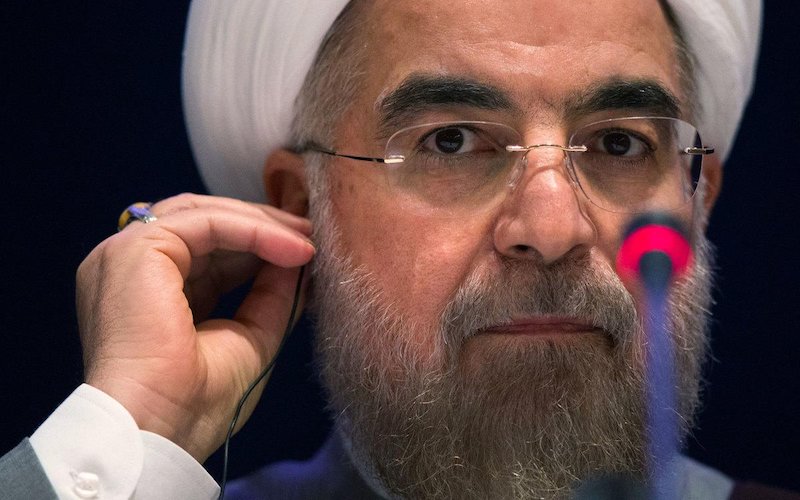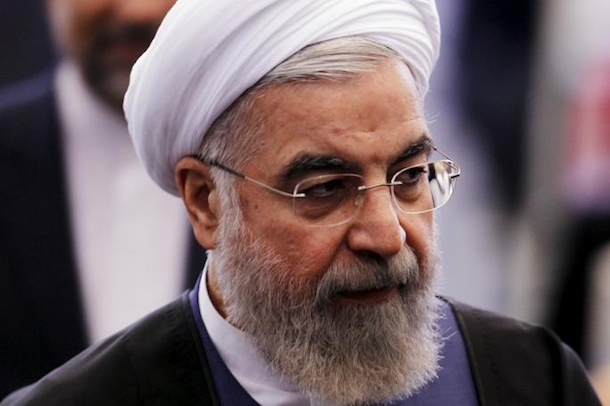
Q&A about Rouhani’s Government and Iran’s Politics
The victory in the recent presidential election in Iran raises many questions in the context of domestic and foreign policy. Will Rouhani be able to make internal political and social reforms? Is it possible to improve Iran’s relations with America? Will he be able to remove non-nuclear sanctions and all sanctions imposed on Iran, as promised in the election campaign? These are questions I’ve asked Shireen Hunter, Research Professor at the Center for Muslim – Christian Understanding at Georgetown University in Washington D.C. and Arshin Adib-Moghaddam, Professor in Global Thought and Comparative Philosophies and Chair of the Centre for Iranian Studies at London Middle East Institutes.
What do you think is the main reason for Rouhani’s victory and reason for the great public participation in the election? Fear of empowerment of the extremists or fear of the war? Would a war happen if Raisi was the president, or was this just a false fear?
Shireen Hunter: The main reason for President Rouhani’s victory at the elections was that a very large majority of Iranians want greater cultural freedoms and better living conditions and avoidance of tensions and conflicts with other countries. They judged that Rouhani was more likely at least to try to achieve some of these goals than Raeisi.
Arshin Adib-Moghaddam: This election was by far less romantic than previous tales of Iranian politics. I said from the outset in several interviews to the global media, that Raisi was an unelectable candidate. Much like a badly cast actor in a B-movie, he lacked charisma, talent and tact. In a country such as Iran, a persona like this cannot win an election. Iran is not the United States, where a politically illiterate bully such as Donald Trump can become President.
Certainly, Raisi would not have brought about stability, either in domestic affairs or in Iran’s international relations. At the time when, Iran and the world are facing a US President who is clearly unstable, an extremist President in Iran would have exacerbated the existing sense of insecurity. The politics of the Rouhani administration are far from perfect, in particular in terms of bringing about social justice and civil liberties, but his re-election will bring about the political stability that Iran needs in order to manage the current re-shuffling in world politics. We are living in an increasingly post-American constellation, and the Trump presidency is accelerating this process of de-Americanization of world politics.
Some have seen this election as the failure of the opposition against the regime. They consider participation of the political refugees in the election as a sign of this failure. However, about fifteen million people boycotted the elections. Will these 15 million people have the capacity to influence future political equations?
Shireen Hunter: I believe no one in Iran wants war. And even if Raeisi had been elected , Iran would not have initiated any conflict. For example, even under Raeisi Iran would have observed the JCPOA ( Barjam). After all, even the Supreme Leader had approved of JCPOA. If war happens, it would be either by accident because of rising tensions in the Persian Gulf and/or Syria or by American action.
Arshin Adib-Moghaddam: The majority of Iranians inside of the country and all over the world believe in gradual change through the ballot box. Everything else is science fiction.
Some people consider the great public participation in the election as a sign of reconciliation of the middle class and the government. Is this a valid argument? Did the middle class votes in this election confirm the legitimacy of the political system?
Shireen Hunter: Iranian people who have suffered much in the last forty years do not want another revolution. Instead they hope for gradual change. This is the main reason why those Iranians living abroad, beyond a minority who are committed to regime change, took part in the elections in order to strengthen the moderate and pro-reform forces in the country.
Arshin Adib-Moghaddam: As for the high turnout: It is an indicator for the belief of Iranians in the democratic infrastructure of the country. Elections count, and Iranians have repeatedly demonstrated their support for public legitimacy and accountability.
The economic slogans of candidates opposing Rouhani in this election were remarkable. Unlike the past elections, economic issues were the central element. Is this a sign of the collapse of revolutionary and religious ideology in Iran? What are the consequences? Is the system becoming secular from within?
Shireen Hunter: I find the 15 million number excessive. Some absenteeism might have had nothing to do with boycotting the elections but rather was caused by such factors as distance, level of education etc. In fact the turn out in the election was very good even compared with western standards.

Arshin Adib-Moghaddam: There is a shared commitment amongst the majority of Iranians to work patiently and rather less erratically towards a political system that appreciates the diversity and complexity of Iranian society which encompasses a wide spectrum of opinions and values. This spectrum includes all institutions of the revolution which need to be digested and ameliorated in order to bring about a new politics of reconciliation which shifts the discourse away from antagonism and ideological infighting. Iran needs a politics of sensitive empathy, a light philosophical, even poetic touch in order to heal the wounds of history. I have explored this in my forthcoming book Psychonationalism: Global Thought, Iranian imaginations which will be published by Cambridge University Press.
We witnessed unprecedented events in this election in the camp of hardliners and conservatives. Amir Tataloo, the rap singer, whose works were long outlawed in Iran, met Ebrahim Raisi, the conservative candidate. Raisi also stated that he is not against women’s participation nor employment, while the conservatives have always encouraged women to stay home and raise children. Are we witnessing a change in the conservatives from inside? What is its effect on the future conservatism in Iran?
Shireen Hunter: The Iranian middle class has been supportive of reform since the 1990’s. So far reforms that have been tried have not been satisfactory. But the Middle class has not much choice, because elections are conducted within a rather rigid framework namely that of an Islamic Republic. Other choices are not available to them. So the middle class chooses the least bad option.
Arshin Adib-Moghaddam: There is certainly a shift in terms of conservative politics in Iran. Political hyperbole and sloganeering are substituted with promises for more freedom and representation. In this sense Iranian conservatives are reformed. This is largely because the preference setting of Iranian society demands this emphasis on pluralism and democratic values.
Besides the presidential election, the “List of Hope,” consisting of reformists and moderates, won the Municipal elections in Tehran. Do you see any hope for empowerment of the reformists in the next four years? Do you think they will be able to make a fundamental change, or will they suffer the same fate as Khatami, the former president?
Shireen Hunter: Economic complaints about Rouhani’s performance were unfair because they do not take into account the limits that Islamic ideology puts on its ability to initiate reforms, attract investment etc. The IRI’s foreign policy which is dominated by the hardliners, for example, is a major contributory factor to Iran’s economic problems. Social restriction also hamper some sectors such as tourism.
Rouhani’s victory and the possibility of Nateghenoori becoming the head of the Expediency Council has raised speculation of the leftist and rightist Clergymen uniting against military forces, especially IRGC and Iran’s Basij force. Have the Clergymen become united against the military? What will be its consequence?
Shireen Hunter: Raeisi was trying very hard to show that he is progressive. His reference to his wife as a professional woman was part of this strategy. His meeting with the rapper was also part of this. However, both his rather rigid personality and his past made these actions look ridiculous rather than convincing.
How do you evaluate IRGC’s future and its role in the political and economic equations after Rouhani’s victory? Will the power of this institution decrease and will there be compromises?
Shireen Hunter: The elections have not changed the real balance of power in the country. The IRGC, various Bonyads, powerful clergy, and the office of the Supreme leader still hold the real power in Iran. Iran’s Constitution also drastically limits the ability of the Parliament to effect reforms through legislation. The best hope for reform in Iran is that these centers of power come to realize that the continuation of the current conditions will not only damage the country, but their own interest and ultimately power.
Rouhani promised for removing the non-nuclear sanction in the second round of presidency, while in America, Trump is not willing to compromise with Iran, and the experts believe that this promise is impossible. Do you think not fulfilling this promise will frustrate voters? Will it have a negative impact on the next presidential election?
Shireen Hunter: The elimination of non-nuclear related sanctions will require a dramatic change in Iran’s foreign policy, including a revision in its position vis-à-vis Israel. Hezbollah, Hamas etc. as well as the acceptance of limits on its missile programs Even then I am not sure that the US will agree to lifting these sanctions especially under the Trump administration.
It must be remembered that, in the past when Iran was ready for compromise, like in 2003, the US refused its overtures. America manipulates the Iran situation for its purposes in the Middle East especially in the Persian Gulf. Having an Iranian threat is convenient for America.
Arshin Adib-Moghaddam: Your questions about the shifts in conservative politics in Iran already indicates that the changes had been real. It is true that in the end ex-President Khatami disappointed the electorate but this was largely because he created a huge discrepancy between the promises he gave and what he delivered. Rouhani doesn’t promise much, so the margin for disappointment is less.
Do you think Rouhani will truly work on political reform or demands like Hashemi Rafsanjani or is his goal only economic development?
Shireen Hunter: Rouhani is unlikely to be able to effect sweeping reforms as was envisaged by the more extremists of the reformist during Khatami presidency, such as reducing the office of the Supreme Leader into a ceremonial position. But within certain limits, especially if he can get the leader’s approval he might be able to implement some reforms.
Arshin Adib-Moghaddam: With the mandate of a second tenure as President, I expect the Rouhani administration to charge with slightly more audacity towards domestic reforms which Iranians are clearly demanding.
In terms of social justice, which has always been a major factor in Iranian politics, the question of Mousavi and Karroubi is secondary. The economic system in the country needs to be reformed in order to cater to an increasingly demanding population. This is only natural.
Considering Trump’s recent visit to the Arabic countries, is there a possibility of detente between Iran and America?
Shireen Hunter: I do not see any possibility of détente between Iran and the US in the near future. I will be satisfied if the tensions did not reach a dangerous point.
Arshin Adib-Moghaddam: As for Trump and his musings: In terms of regional developments and a proper understanding of Iranian affairs, the Trump administration is not only illiterate, it is on the wrong side of history. This lack of intelligence of the US President is a real problem for the world, including Iran. How can you speak to someone who is clearly incapable of understanding? I see managing this incompetence of the US President as the main challenge of the Rouhani years.

